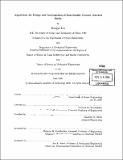| dc.contributor.advisor | Nicholas M. Patrikalakis and Emanuel M. Sachs. | en_US |
| dc.contributor.author | Liu, Hongye, 1970- | en_US |
| dc.contributor.other | Massachusetts Institute of Technology. Dept. of Ocean Engineering. | en_US |
| dc.date.accessioned | 2005-09-27T20:10:50Z | |
| dc.date.available | 2005-09-27T20:10:50Z | |
| dc.date.copyright | 2000 | en_US |
| dc.date.issued | 2000 | en_US |
| dc.identifier.uri | http://hdl.handle.net/1721.1/9044 | |
| dc.description | Thesis (S.M.)--Massachusetts Institute of Technology, Dept. of Ocean Engineering; and, (S.M.)--Massachusetts Institute of Technology, Dept. of Mechanical Engineering, 2000. | en_US |
| dc.description | Includes bibliographical references (leaves 109-112). | en_US |
| dc.description.abstract | A Functionally Gradient Material (FGM) part is a 3D solid object that has varied local material composition that is defined by a specifically designed function. Recently, research has been performed at MIT in order to exploit the potential of creating FGM parts using a modern fabrication process, 3D Printing, that has the capability of controlling composition to the length scale of 100 [mu]m. As part of the project of design automation of FGM parts, this thesis focuses on the issue of the development of efficient algorithms for design and composition interrogation. Starting with a finite element based 3D model, the design tool based on the distance function from the surface of the part and the design tool allowing the user to design within a .STL file require enhanced efficiency and so does the interrogation of the part. The approach for improving efficiency includes preprocessing the model with bucket sorting, digital distance transform of the buckets and an efficient point classification algorithm. Based on this approach, an efficient algorithm for distance function computation is developed for the design of FGM through distance to the surface of the part or distance to a .STL surface boundary. Also an efficient algorithm for composition evaluation at a point, along a ray or on a plane is developed. The theoretical time complexities of the developed algorithms are analyzed and experimental numerical results are provided. | en_US |
| dc.description.statementofresponsibility | by Hongye Liu. | en_US |
| dc.format.extent | 112 leaves | en_US |
| dc.format.extent | 6601671 bytes | |
| dc.format.extent | 6601430 bytes | |
| dc.format.mimetype | application/pdf | |
| dc.format.mimetype | application/pdf | |
| dc.language.iso | eng | en_US |
| dc.publisher | Massachusetts Institute of Technology | en_US |
| dc.rights | M.I.T. theses are protected by copyright. They may be viewed from this source for any purpose, but reproduction or distribution in any format is prohibited without written permission. See provided URL for inquiries about permission. | en_US |
| dc.rights.uri | http://dspace.mit.edu/handle/1721.1/7582 | |
| dc.subject | Ocean Engineering. | en_US |
| dc.title | Algorithms for design and interrogation of functionally graded material solids | en_US |
| dc.type | Thesis | en_US |
| dc.description.degree | S.M. | en_US |
| dc.contributor.department | Massachusetts Institute of Technology. Department of Mechanical Engineering | |
| dc.contributor.department | Massachusetts Institute of Technology. Department of Ocean Engineering | |
| dc.identifier.oclc | 47940777 | en_US |
